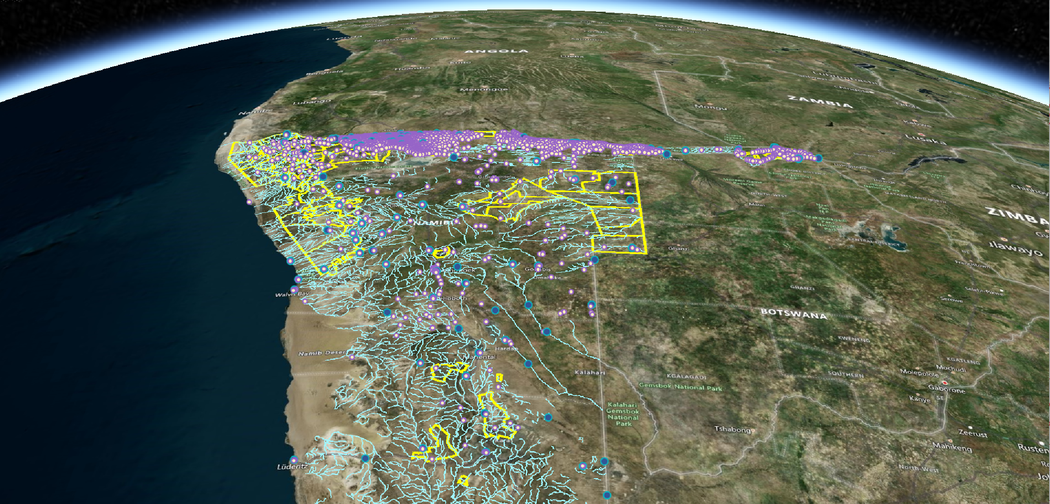Nature-based regenerative economies are critical for dealing with climate change, and are part of the solution for preventing the ongoing mass extinction of biodiversity. Half of Africa's bird and mammal species could disappear by the end of this century, due to human activities that produce climate change, pollution, habitat destruction, and over-exploitation of the natural environment.

Converting land into natural reserves is not enough to save this extinction. So we need to re-engineer economies, to become nature-based. This transition to nature-based economy will create incredible new opportunities for human development that is synergistic with ecological regeneration.
Nature-based Solutions
Building nature-based economies starts by understanding and valuing the inventories of natural systems, and then creating inclusive markets for carbon, capital, goods and services, that build on these natural assets. This market-based approach is generally described as Nature-based Solutions (NbS).
Nature-based solutions include all types of economic activities that generate capital flows and value exchanges from storing carbon, maintaining areas of vegetation to protect against higher temperatures, conserving biodiveristy, preventing further climate-driven increases in storm severity and frequency and the providing of a range of other services, such as pollination, sustainable food production, and treatment of pollution. In essence, NbS are an ecological approach to climate change action, that also enhance the resilience of natural and managed ecosystems, and the human settlements that adjoin them.
The economic and environmental case for carbon capture are clear. But nature-based economics is not straightforward, and the rising popularity of tree-planting DAOs and NFTs can only be a small part of the solution. Natural systems such as forests provide different benefits at different times. For instance, as a growing forest reaches maturity, it nears a balance between additional carbon gains and losses, and so contributes little more to storage. Conversely, climate adaptation and other ecosystem benefits may increase to their maximum values as the forest reaches maturity.
Natural systems are both local and global. Carbon-capture (or carbon release–when established habitats are disturbed) have global value, but most of the economic benefits of nature-based solutions tend to be very location-specific.
Critical Habitat Zones
Our recent article Critical Habitat Zones described how a tokenised nature-based economy is beginning to be created through initiatives that connect Earth State to Chain State, such as the ixo Internet of Impact, on which marketplaces for nature-based solutions are now being built.

David Wood the founder of Waddapt, is a passionate technologist and conservationist who has been building a Critical Habitat Zones digital marketplace and geospatial mapping applications, in collaboration with ixo.
ReFi for Nature-based Solutions
Blockchain ledgers are critical for recording and managing the state of nature-based inventories over time. Tokenisation is the best technology we have to digitally represent natural assets, to include these assets in the accounting, financing, and trade mechanisms that are the basis for economic systems. This is an incredible opportunity for ReFi innovations to be built on verified state-changes of the natural assets within specific geographic localities, and human settlements.
Digital Financing of Conservation in Namibia
David describes how a new initiative has begun to create a digital twin of an area that covers 4 million hectares of community-based conservation land in Namibia (see the screenshot above of the how data that has already been collected is being mapped using geo-spatial mapping tools).
This builds on the incredible work of local community members who have been the custodians of this land and its wildlife for more than the past two decades. Over the years, this leading conservation initiative in Namibia has produced a great set of historical data in analog formats, which has economic potential that has not yet been realised.
The Namibian national constitution mandates the “maintenance of ecosystems, essential ecological processes and biological diversity of Namibia and utilisation of living natural resources on a sustainable basis for the benefit of the Namibians, both present and future.”
Under this constitution, Communal conservancies have been established in Namibia as part of a rights-based Community-Based Natural Resource Management movement that empowers communities to manage and benefit from their wildlife by registering as a conservancy. Since the first four conservancies were established in 1998, the number of conservancies has expanded to 86, covering 166,179 km² (20.1 per cent of Namibia), which include settlements of around 225,000 community members (9 per cent of Namibia’s population). Notably, 32 of the conservancies are located immediately adjacent to national parks or in critical corridors between parks, thus directly contributing to the viability of Namibia’s protected area system and the ability to promote conservation at a landscape scale.
The new system under development will capture, store, analyse, manage, and present all types of spatial and attribute data in a verifiable digital format. This will provide a transparent, automated, and verifiable record of conservation performance in all participating conservancies, that can be linked to wildlife conservation performance-based payment mechanisms.
Conservation projects that are financed and implemented through the Critical Habitat Zones Ecoverse are being built on the ixo blockchain Internet of Impact, through which verifiable claims will be made about the state of natural assets in these zones. Community members will receive tokenised incentives for submitting claims and for working as human oracles who will submit observation data from the ground, with outcomes evaluated by professional verification agencies. Verified positive state-change outcomes, such as increases in wildlife population numbers and health, will produce non-fungible tokens that can be valued, financed, used as collateral, and traded for capital and executable rights. Results-based digital financing mechanisms (ixo Alphabonds) are being explored as part of this solution.
This exciting development has incredible potential for building on the legacy of conservation in Namibia. However, David cautions that Nature-based Solutions could create perverse incentives, if these are implemented in ways that simply replicate the extractive and destructive business models and patterns of economy that got humanity into this mess.
Many critical habitat zones are in remote locations where there is minimal technology infrastructure. The cultural norms and practices of local communities need to be deeply understood and people don't always accept new ideas or technologies –especially from foreign people coming in to tell them how to live differently.
How these technologies are developed and implemented –in partnership with all stakeholders and local communities– is therefore going to determine if Tokenised Nature-based Economies can become viable and sustainable. The work currently underway will be critical to the success of this bold initiative, and should generate valuable insights for similar initiatives across the world.






